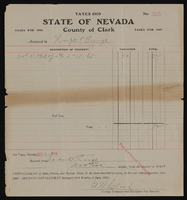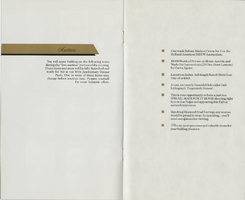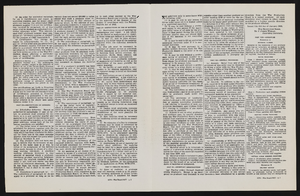Search the Special Collections and Archives Portal
Search Results
Charles P. and Delphine Squires Papers
Identifier
Abstract
The Charles P. and Delphine Squires Papers from 1882 to 1964, with bulk dates from 1905 to 1964, contain book and short story manuscripts, articles, press releases, newspaper clippings, and radio scripts written by Squires and his wife, all relating to their early life in Las Vegas. Also included are report cards, certificates, Parent Teacher Association material, Mesquite Club records and church activity materials.
Archival Collection
History of Nursing in Southern Nevada Oral History Project Records
Identifier
Abstract
The History of Nursing in Southern Nevada Oral History Project Records (1965-2014) are comprised of material related to a volunteer project initiative at the University of Nevada, Las Vegas School of Nursing to conduct oral history interviews with nurses who have practiced in Southern Nevada. The collection contains subject files related to the project, as well as audio, video, and transcript files for the interviews. The collection also includes general information on nursing in Southern Nevada such as research papers and documents from the Nevada Nurses Association.
Archival Collection
Robert E. Robinson Legislative Papers
Identifier
Abstract
The Robert E. Robinson Legislative Papers are comprised of materials relating to Robert Robinson’s career in the Nevada State Legislature as an assemblyman and senator from 1970 to 1986. The papers include correspondence, assembly bill research, bill proposals, roll calls, and materials from assembly committee meetings. The collection also contains Robinson’s campaign materials, including financial disclosures, press releases, advertisements, and correspondence with voters.
Archival Collection
Thomas Clark Professional Papers
Identifier
Abstract
The Thomas Clark Professional Papers (1950-1998) contain materials from his tenure as a Professor of English at the University of Nevada, Las Vegas (UNLV), which are divided into two series. The gaming research series includes newspaper clippings, correspondence, brochures, bulletins and articles. Also included are book chapters, a glossary of terms used in the casino industry, and gambling guides. In the linguistics and teaching series there are research files, articles, speeches, correspondence, interviews, multimedia, workshops, and conference materials. Also included are files on graffiti, symbolism, ethnic and regional speech differences, language usage, and National Council of Teachers of English (NCTE) material. Additional materials include colleague publications and cassette tapes of interviews from students in courses Clark taught at UNLV.
Archival Collection

Nora Mirabal interview, August 30, 2019: transcript
Date
Archival Collection
Description
Interviewed by Elsa Lopez and Barbara Tabach. Cuban refugee family by way of Spain and then to the US; arrived in Las Vegas in 1973 when Nora was 9 years old. Struggled in youth but rises up as embraces educaton. Currently is Assistant Director of Academic Partnership at CSN.
Text

Tax bills and receipts: Sadie George
Date
Archival Collection
Description
Text

Temple Beth Sholom 40th Anniversary Celebration invitation, April 23, 1988
Date
Archival Collection
Description
An invitation to Temple Beth Sholom's 40th anniversary celebration at the Alexis Park Resort in Las Vegas, Nevada.
Text

Transcript of interview with Frankie Perez by Elsa Lopez and Laurents Bañuelos-Benitez, November 5, 2018
Date
Archival Collection
Description
Frankie Perez (1986- ) is an individual that constantly found himself navigating two worlds, whether it was military versus civilian; female versus male; or being Latinx in the United States. As a result of this navigation, Perez has a unique perspective on our ever more complicated world that not many individuals possess. Perez served in the military during the Do Not Ask, Do Not Tell policy which made it difficult for someone dealing with gender identity, to seek out the proper support they need. Despite the policy, and other policies that were put in place afterwards to inhibit the transgender community in the military, Perez began his transition while still serving his country. In direct contradiction of popular opinion, Perez discovered that the military easily accommodated his transition. Outside of the military Perez is an active voice in the LGBTQ community. As a member of the LGBTQ, Latinx, and military community, Perez has a unique perspective that he uses to fight for both LGBTQ and Latinx rights. Currently, Perez is finishing his degree in gender and sexuality studies at UNLV. He hopes to use his education to help people have the difficult discussions and improve conditions for his communities.
Text


